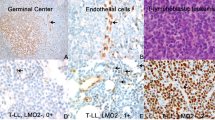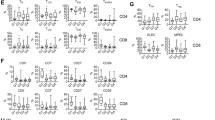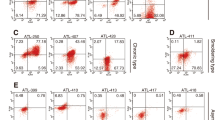Abstract
FOXP3 is a forkhead transcription factor family member, implicated in T-cell regulation, activation and differentiation. FOXP3 has been shown to be a master control gene for the development and function of CD4+/CD25+ regulatory T-cells (Treg). In this study, FOXP3 protein expression has been analysed using a new anti-FOXP3 monoclonal antibody in 172 paraffin-embedded lymphoma samples. FOXP3 expression in tumour cells was confined to adult T-cell leukaemia/lymphoma (ATLL) cases (17/25, 68%), with some variability in the intensity of the staining and the proportion of positive cells. No other lymphoma types studied exhibited FOXP3 expression in the malignant population. The selective expression of FOXP3 by tumour cells in ATLL makes this antibody a potentially useful diagnostic tool.
This is a preview of subscription content, access via your institution
Access options
Subscribe to this journal
Receive 12 print issues and online access
$259.00 per year
only $21.58 per issue
Buy this article
- Purchase on Springer Link
- Instant access to full article PDF
Prices may be subject to local taxes which are calculated during checkout




Similar content being viewed by others
References
Fontenot JD, Rudensky AY . A well adapted regulatory contrivance: regulatory T cell development and the forkhead family transcription factor Foxp3. Nat Immunol 2005; 6: 331–337.
Kronenberg M, Rudensky A . Regulation of immunity by self-reactive T cells. Nature 2005; 435: 598–604.
Hori S, Nomura T, Sakaguchi S . Control of regulatory T cell development by the transcription factor Foxp3. Science 2003; 299: 1057–1061.
Bennett CL, Ochs HD . IPEX is a unique X-linked syndrome characterized by immune dysfunction, polyendocrinopathy, enteropathy, and a variety of autoimmune phenomena. Curr Opin Pediatr 2001; 13: 533–538.
Bennett CL, Christie J, Ramsdell F, Brunkow ME, Ferguson PJ, Whitesell L et al. The immune dysregulation, polyendocrinopathy, enteropathy, X-linked syndrome (IPEX) is caused by mutations of FOXP3. Nat Genet 2001; 27: 20–21.
Ochs HD, Ziegler SF, Torgerson TR . FOXP3 acts as a rheostat of the immune response. Immunol Rev 2005; 203: 156–164.
Godfrey VL, Wilkinson JE, Russell LB . X-linked lymphoreticular disease in the scurfy (sf) mutant mouse. Am J Pathol 1991; 138: 1379–1387.
Roncador G, Brown P, Maestre L, Hue S, Martínez-Torrecuadrada J, Ling K et al. Analysis of FOXP3 protein expression in human CD4+CD25+ regulatory T cells at the single cell level. Eur J Immunol 2005; 35: 1681–1691.
Fontenot JD, Gavin MA, Rudensky AY . Foxp3 programs the development and function of CD4+CD25+ regulatory T cells. Nat Immunol 2003; 4: 330–336.
Khattri R, Cox T, Yasayko SA, Ramsdell F . An essential role for Scurfin in CD4+CD25+ T regulatory cells. Nat Immunol 2003; 4: 337–342.
Hori S, Sakaguchi S . Foxp3: a critical regulator of the development and function of regulatory T cells. Microbes Infect 2004; 6: 745–751.
Watanabe S . Adult T-cell leukemia/lymphoma. In: Knowles DM, (ed). Neoplastic Hematopathology, 2nd edn. Philadelphia, PA: Lippincott Williams & Wilkins, 2001, 1603–1616.
Shimoyama M . Diagnostic criteria and classification of clinical subtypes of adult T-cell leukaemia-lymphoma. A report from the Lymphoma Study Group (1984–1987). Br J Haematol 1991; 79: 428–437.
Jaffe E, Harris N, Stein H, Vardiman J . Tumours of Haematopoietic and Lymphoid Tissues. Lyon: IARC Press, 2001.
Nicot C . Current views in HTLV-I-associated adult T-cell leukemia/lymphoma. Am J Hematol 2005; 78: 232–239.
Uchiyama T, Hori T, Tsudo M, Wano Y, Umadome H, Tamori S et al. Interleukin-2 receptor (Tac antigen) expressed on adult T cell leukemia cells. J Clin Invest 1985; 76: 446–453.
Karube K, Ohshima K, Tsuchiya T, Yamaguchi T, Kawano R, Suzumiya J et al. Expression of FoxP3, a key molecule in CD4CD25 regulatory T cells, in adult T-cell leukaemia/lymphoma cells. Br J Haematol 2004; 126: 81–84.
Ohshima K, Kikuchi M, Masuda Y, Kobari S, Sumiyoshi Y, Eguchi F et al. Defective provirus form of human T-cell leukemia virus type I in adult T-cell leukemia/lymphoma: clinicopathological features. Cancer Res 1991; 51: 4639–4642.
Ohshima K, Yoshida T, Kikuchi M, Masuda Y, Kimura N, Satoh H . Rearrangement of human T cell receptor beta and gamma chain genes in adult T cell leukemia/lymphoma. Hematol Oncol 1990; 8: 111–118.
Martinez-Ramirez A, Cigudosa JC, Maestre L, Rodriguez-Perales S, Haralambieva E, Benitez J et al. Simultaneous detection of the immunophenotypic markers and genetic aberrations on routinely processed paraffin sections of lymphoma samples by means of the FICTION technique. Leukemia 2004; 18: 348–353.
Graca L . New tools to identify regulatory T cells. Eur J Immunol 2005; 35: 1678–1680.
Vieira PL, Christensen JR, Minaee S, O'Neill EJ, Barrat FJ, Boonstra A et al. IL-10-secreting regulatory T cells do not express Foxp3 but have comparable regulatory function to naturally occurring CD4+CD25+ regulatory T cells. J Immunol 2004; 172: 5986–5993.
Matsubara Y, Hori T, Morita R, Sakaguchi S, Uchiyama T . Phenotypic and functional relationship between adult T-cell leukemia cells and regulatory T cells. Leukemia 2005; 19: 482–483.
Moriyama K, Muranishi H, Nishimura J, Tanaka K, Asayama R, Takita A . Immunodeficiency in preclinical smoldering adult T-cell leukemia. Jpn J Clin Oncol 1988; 18: 363–369.
Read S, Powrie F . CD4(+) regulatory T cells. Curr Opin Immunol 2001; 13: 644–649.
Alvaro T, Lejeune M, Salvado MT, Bosch R, Garcia JF, Jaen J et al. Outcome in Hodgkin's lymphoma can be predicted from the presence of accompanying cytotoxic and regulatory T cells. Clin Cancer Res 2005; 11: 1467–1473.
Curiel TJ, Coukos G, Zou L, Alvarez X, Cheng P, Mottram P et al. Specific recruitment of regulatory T cells in ovarian carcinoma fosters immune privilege and predicts reduced survival. Nat Med 2004; 10: 942–949.
Acknowledgements
We are indebted to the CNIO immunohistochemistry unit for excellent technical assistance, to the CNIO Tumour Bank Network for providing the paraffin-embedded tissue used in this study and to the hospitals, which provided tissue samples for this study. Thanks to Lorraine Tracey for her valuable help with the review of the text. Financial Support: This work was supported by grants from the Ministerio de Ciencia y Tecnología (BIO2000-0275-C02/01-/02, SAF2001-0060), Comunidad Autónoma de Madrid (CAM 08.1/0011/2001.1) and the Fondo de Investigación Sanitaria of the Ministerio de Sanidad y Consumo (FIS 01-0035/G03/179), Spain. JFGVM is a recipient of a grant from the Ministerio de Ciencia y Tecnología (FP-2001-0977), Spain and AHB is supported by the Leukaemia Research Fund.
Author information
Authors and Affiliations
Corresponding author
Rights and permissions
About this article
Cite this article
Roncador, G., Garcia, J., Garcia, J. et al. FOXP3, a selective marker for a subset of adult T-cell leukaemia/lymphoma. Leukemia 19, 2247–2253 (2005). https://doi.org/10.1038/sj.leu.2403965
Received:
Accepted:
Published:
Issue Date:
DOI: https://doi.org/10.1038/sj.leu.2403965
Keywords
This article is cited by
-
The role of FOXP3 rs3761548 and rs2294021 polymorphisms in pediatrics acute lymphoblastic leukemia: association with risk and response to therapy
Molecular Biology Reports (2021)
-
Prognostic role of regulatory T cells in lymphoma: a systematic review and meta-analysis
Journal of Cancer Research and Clinical Oncology (2020)
-
Transcriptional analysis distinguishes breast implant-associated anaplastic large cell lymphoma from other peripheral T-cell lymphomas
Modern Pathology (2019)
-
FOXP3 can modulate TAL1 transcriptional activity through interaction with LMO2
Oncogene (2016)
-
Automated prognostic pattern detection shows favourable diffuse pattern of FOXP3+ Tregs in follicular lymphoma
British Journal of Cancer (2015)



